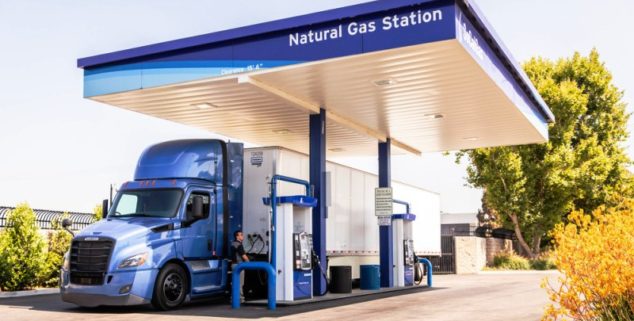Opinion
Renewable gas really is too good to be true
 A station providing renewable natural gas in Southern California. (Photo: Southern California Gas Co.)
A station providing renewable natural gas in Southern California. (Photo: Southern California Gas Co.)As California ramps up efforts to improve air quality and reduce greenhouse gas emissions statewide, one polluting industry, in particular, is fighting to maintain relevance.
In the face of local governments, state regulators, health professionals, and environmental groups calling for clean energy homes and buildings that can be powered with renewable electricity instead of gas, SoCalGas, a subdivision of Sempra Energy, is calling for an unrealistic alternative: “renewable” gas.
Recently, SoCalGas announced plans to offer customers renewable gas or biomethane. Biomethane comes from methane that’s captured at dairies, landfills, and wastewater treatment facilities, and is then processed, refined and injected into the utility pipeline for customers to burn like conventional gas in their homes for heating and cooking.
Ultimately, SoCalGas has ambitions to ramp up the production of biomethane to account for 20 percent of the utility’s gas supply by 2030.
Once biomethane gas hits the pipeline, it is identical to natural gas, bringing all of the same health and safety risks we need to eliminate.
While there may be a limited role for biomethane in California’s energy portfolio for now, it isn’t the clean or green energy solution the gas industry is claiming it to be, and it could become a dangerous distraction as we transition off of fossil fuels in pursuit of a zero-carbon economy by 2045.
First and foremost, biomethane is not a clean fuel. It comes from polluting sources like landfills and factory farms—which are often located in disadvantaged communities—that impact the health and enjoyment of local residents.
California dairies, located mostly in the Central Valley, are especially bad neighbors. Animal manure is a contributor to nitrate pollution in groundwater, which can be dangerous, especially for infants. Meanwhile, the decomposition of manure causes ammonia gases to be released into the atmosphere, leading to respiratory problems and volatile organic compounds and dust from dairy operations further threaten air quality and exacerbate respiratory diseases like asthma.
Once biomethane gas hits the pipeline, it is identical to natural gas, bringing all of the same health and safety risks we need to eliminate.
It leaks methane pollution like gas, explodes like gas, is a potent fire risk like gas, is dependent on an aging and dangerous infrastructure like gas, and releases carbon dioxide when burned – just like gas.
For too long, we’ve accepted the negative impacts of fossil fuels, and for too long, disadvantaged communities have disproportionately been impacted. In California in the 21st century, we shouldn’t have to risk life and limb to heat our homes and food, and we shouldn’t subject vulnerable communities to more risk. And with clean energy, we don’t have to.
It’s also a myth that biomethane can significantly reduce our dependence on conventional natural gas in California.
The fact is that the fuel potential of biomethane is extremely limited, the gas industry themselves project that it could only meet 4 percent of gas demand. Scaling up the production of renewable gas to hit the targets SoCalGas is calling for would require a costly investment in factory farms, which will only solidify – if not expand — their current practices, ensuring that pollution, and the devastating health impacts, continue to plague nearby communities.
Expanding the role for biomethane would also require massive resources to expand the gas system at the very time state regulators are calling for California to shift off of fossil fuels. Using biomethane to replace true zero-emission solutions, like replacing gas furnaces and water heaters with more advanced and high performing electric appliances, would be a bad deal for the health and safety of Californians.
The recent Intergovernmental Panel on Climate Change report made it painfully clear that we have no time to waste in reducing emissions.
California should continue efforts to replace gas with efficient electric appliances that run on clean energy instead of investing in an expansion of biomethane. This will lower energy bills, create cleaner air and water, generate new jobs, and improve everyone’s safety, comfort and climate-resiliency.
Every step on the journey towards fair and equitable climate resilience matters. We don’t have time or resources to waste on false solutions from fossil fuel companies that intensify pollution and harm vulnerable communities.
—
Editor’s Note: Phoebe Seaton is the co-founder, co-director and legal director of Leadership Counsel for Justice and Accountability Rachel Golden is a senior campaign representative for the Sierra Club’s My Generation campaign
Want to see more stories like this? Sign up for The Roundup, the free daily newsletter about California politics from the editors of Capitol Weekly. Stay up to date on the news you need to know.
Sign up below, then look for a confirmation email in your inbox.

Leave a Reply